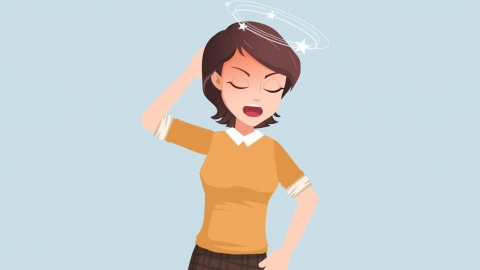What causes dizziness when lying down or getting up?
Generally, dizziness upon lying down or standing up may be caused by dehydration, orthostatic hypotension, anemia, benign paroxysmal positional vertigo, cervical spondylosis, and other conditions. Symptomatic management such as lifestyle adjustments and medication may be needed. If symptoms occur, timely medical consultation is advised. Detailed explanations are as follows:

1. Dehydration
When dehydrated, the body's fluid levels decrease, leading to reduced blood volume and increased blood viscosity. This diminishes the heart's efficiency in pumping blood, potentially causing transient cerebral hypoperfusion and dizziness. It is recommended to replenish fluids promptly, especially during hot weather or after physical activity, by increasing water intake appropriately.
2. Orthostatic Hypotension
When transitioning rapidly from lying down or sitting to standing, blood must quickly redistribute to maintain cerebral perfusion. If this adjustment occurs too quickly, temporary reduction in cerebral blood flow may result in dizziness, sometimes accompanied by blurred vision, tinnitus, cold sweats, and other symptoms. It is recommended to change positions slowly and avoid sudden rising from lying or sitting positions.
3. Anemia
Anemia caused by iron deficiency or other factors reduces the blood's oxygen-carrying capacity, affecting oxygen supply to the brain and causing dizziness. Symptoms may also include pallor, fatigue, palpitations, and more. It is recommended to follow medical advice to use medications such as ferrous sulfate sustained-release tablets, iron(II) fumarate tablets, ammonium ferric citrate and vitamin B1 syrup to alleviate symptoms.
4. Benign Paroxysmal Positional Vertigo (BPPV)
BPPV occurs when dislodged otoconia in the inner ear move with changes in body position, stimulating the semicircular canals and causing brief episodes of vertigo. Symptoms may include nystagmus, nausea, and vomiting. It is recommended to follow medical guidance for treatment using medications such as promethazine hydrochloride tablets, betahistine hydrochloride tablets, and ginkgo biloba extract tablets.
5. Cervical Spondylosis
Chronic strain or degeneration of the cervical spine may lead to cervical spondylosis, which can compress blood vessels and nerves, causing cerebral hypoperfusion and dizziness. Additional symptoms may include neck pain, numbness in the upper limbs, nausea, and others. It is recommended to follow medical advice for treatment using medications such as aceclofenac tablets, Jingfukang granules, and methylcobalamin tablets.
It is also recommended to engage in moderate aerobic exercise regularly, such as walking or jogging, to help enhance cardiovascular function and the body's regulatory capacity.








